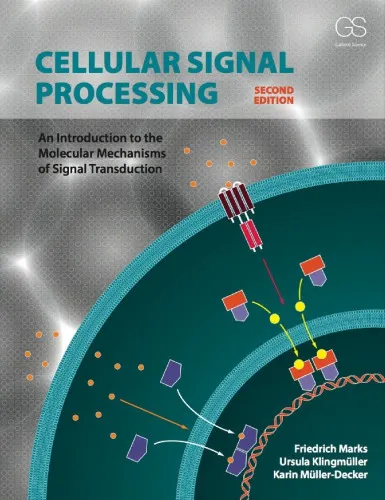Cellular Signal Processing: An Introduction to the Molecular Mechanisms of Signal Transduction
4.3
Reviews from our users

You Can Ask your questions from this book's AI after Login
Each download or ask from book AI costs 2 points. To earn more free points, please visit the Points Guide Page and complete some valuable actions.Related Refrences:
Introduction to "Cellular Signal Processing"
"Cellular Signal Processing: An Introduction to the Molecular Mechanisms of Signal Transduction" serves as a comprehensive guide for anyone interested in the detailed workings of cellular communication. Written by Friedrich Marks, Ursula Klingmuller, and Karin Muller-Decker, this book provides an in-depth exploration into the dynamic world of signal transduction, a pivotal aspect of cellular biology. Making complex scientific concepts approachable, it is a crucial resource for students, educators, and researchers alike.
Detailed Summary of the Book
The book is meticulously structured to cover the fundamentals as well as the advanced aspects of cellular signal processing. It begins with an introduction to the basic principles of cell communication and the nature of cellular signals. Following this, it delves into the biochemical pathways and molecular mechanisms that govern these signals, ensuring clarity by breaking down intricate processes into digestible segments.
Further chapters explore specific signaling pathways, including G-protein-coupled receptors, receptor tyrosine kinases, and nuclear receptors. Each pathway is detailed with a focus on its biological significance and the implications of its dysregulation in diseases. The authors also provide a historical context to signal transduction research, allowing readers to appreciate the evolution of this scientific field.
In later sections, the book transitions into discussing the technological advancements that have propelled signal transduction research forward. From molecular cloning techniques to high-throughput screenings, the authors outline how these tools have enhanced our understanding of cellular processes.
Key Takeaways
- Understanding signal transduction is crucial for comprehending how cells respond to their environment and communicate with each other.
- Disruptions in cellular signaling pathways can lead to various diseases, including cancer and metabolic disorders.
- The book illustrates the interconnectedness of different signaling routes and emphasizes the complexity of cellular networks.
- Technological advancements and methodological approaches are key drivers of progress in signal transduction research.
Famous Quotes from the Book
"The essence of cellular life lies in the cell's ability to perceive and properly respond to its environment."
"Signal transduction is not merely a cascade of biochemical events; it is the transmission of life’s language."
Why This Book Matters
"Cellular Signal Processing" is pivotal because it bridges the gap between complex scientific concepts and practical understanding. It matters for the scientific community and for medical professionals working to develop treatments targeting signal transduction pathways. This book provides the foundational knowledge necessary for innovation in biomedical research, particularly in drug development and genetic therapies.
In academia, the book serves as an essential educational tool that encourages students to embark on a journey of discovery within the molecular realm. Its comprehensive coverage ensures that readers gain a holistic view of cellular signaling, which is indispensable for contributing to future scientific advancements.
Overall, this book's integration of theoretical knowledge with real-world applications makes it an invaluable resource, paving the way for advancements in understanding the communication within and between cells.
Free Direct Download
You Can Download this book after Login
Accessing books through legal platforms and public libraries not only supports the rights of authors and publishers but also contributes to the sustainability of reading culture. Before downloading, please take a moment to consider these options.
Find this book on other platforms:
WorldCat helps you find books in libraries worldwide.
See ratings, reviews, and discussions on Goodreads.
Find and buy rare or used books on AbeBooks.
1456
بازدید4.3
امتیاز0
نظر98%
رضایتReviews:
4.3
Based on 0 users review
Questions & Answers
Ask questions about this book or help others by answering
No questions yet. Be the first to ask!














